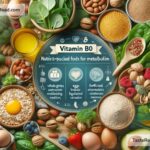The Role of Vitamin B8 in Metabolic Health
When we think about vitamins, we usually hear about Vitamin C for our immune system or Vitamin D for strong bones. But have you heard of Vitamin B8? Even though it’s less famous, Vitamin B8 is a superstar when it comes to keeping our bodies running smoothly—especially for metabolic health. In this article, we’ll dive into what Vitamin B8 is, why it’s important, and how you can make sure you’re getting enough of it.
What is Vitamin B8?
Vitamin B8, also known as inositol, is a type of sugar alcohol found in the body and many foods. It’s mostly grouped with the B-complex vitamins, but technically it’s not a “true vitamin” because our bodies can produce it on their own.
Inositol comes in several forms, with myo-inositol being the most common and widely studied. You can find it naturally in foods like fruits, beans, grains, and nuts. While your body can make inositol from glucose, certain factors—like diet, lifestyle, and health conditions—can affect how much you have. That’s why understanding its role and ensuring you consume enough through food or supplements can be helpful.
Why Does Metabolic Health Matter?
Before we dive into Vitamin B8’s role, let’s talk about metabolic health. Metabolism is the process your body uses to transform food into energy. It also involves how your body handles sugar, fat, and other nutrients. When your metabolism isn’t working properly, it can lead to issues like high blood sugar, weight gain, insulin resistance, or even diabetes.
Staying metabolically healthy is important for maintaining a steady supply of energy, staying fit, and reducing the risk of chronic diseases. And this is where Vitamin B8 plays a big role.
How Vitamin B8 Supports Metabolic Health
Vitamin B8 is essential for several processes in the body related to metabolism. Let’s look closer at what it does:
- Helps Regulate Blood Sugar Levels
One of the most important roles of Vitamin B8 is its ability to improve how your body processes sugar. It supports insulin sensitivity, which means your cells respond better to insulin (the hormone that helps your body absorb sugar from the blood). When your cells don’t respond properly to insulin, it can lead to high blood sugar levels and eventually insulin resistance—a major risk factor for type 2 diabetes.
Studies show that people with insulin resistance or conditions like type 2 diabetes benefit from inositol supplementation because it helps their bodies use insulin effectively and lowers blood sugar levels.
- Improves Fat Metabolism
Vitamin B8 also plays a role in breaking down fat in your body. It supports lipid metabolism, helping your body manage cholesterol and triglyceride levels. High levels of LDL cholesterol (the “bad” cholesterol) or triglycerides can strain your heart and increase the risk of cardiovascular disease.
Inositol has shown promising results in improving the balance of fats in the body, which is a critical aspect of metabolic health.
- Supports Hormonal Balance
Hormonal health and metabolism are closely linked. Vitamin B8 is particularly beneficial for women with polycystic ovary syndrome (PCOS), a condition that affects hormone levels and disrupts metabolism. PCOS can cause insulin resistance, weight gain, irregular menstrual cycles, and other metabolic issues.
Inositol supplements have been found to help manage PCOS symptoms by improving insulin sensitivity, restoring hormonal balance, and regulating menstrual cycles. This makes Vitamin B8 a key player for metabolic health, especially in women.
- Boosts Mood and Brain Health
Metabolism isn’t just about physical health—it’s also linked to mental well-being. Vitamin B8 is involved in producing neurotransmitters, the chemical messengers in your brain. It can help reduce symptoms of anxiety and depression, which are sometimes linked to poor metabolic health.
When you feel stressed or anxious, it may affect how your body processes food and energy. By supporting brain health, inositol indirectly contributes to a healthy metabolism.
How Can You Get More Vitamin B8?
The good news is that Vitamin B8 is readily available in many foods. Here are some ways to get it:
– Foods High in Inositol: You can find inositol naturally in fruits (citrus fruits, cantaloupe), beans, whole grains, and nuts. Adding these foods to your diet is a simple way to improve your intake.
– Supplements: If you need a higher dose for specific health conditions like PCOS or insulin resistance, supplements are available. Myo-inositol is the most common form found in health stores. Always talk to your doctor before starting any new supplements.
Conclusion
While it may not always get the spotlight like other vitamins, Vitamin B8 (inositol) plays a crucial role in keeping your metabolism healthy. It helps regulate blood sugar, improve fat metabolism, balance hormones, and even support brain health. If you’re struggling with metabolic issues or simply want to stay on top of your health, paying attention to your Vitamin B8 intake is worth considering.
Remember, the key to a healthy life is a balanced approach—eating nutritious foods, staying active, and understanding how nutrients like Vitamin B8 can support your overall well-being. So go ahead, fuel your body with foods rich in Vitamin B8, and give your metabolism the boost it deserves!


